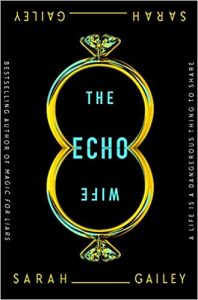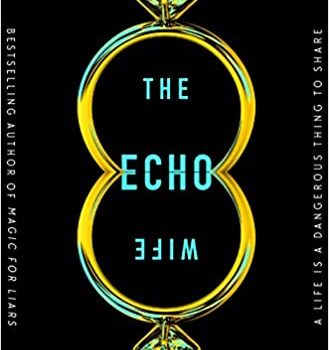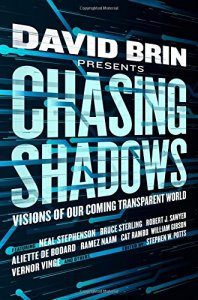Gary K. Wolfe and Adrienne Martini Review The Echo Wife by Sarah Gailey
 The Echo Wife, Sarah Gailey (Tor 978-1-250-17466-6, $24.99, 256pp, hc) February 2021.
The Echo Wife, Sarah Gailey (Tor 978-1-250-17466-6, $24.99, 256pp, hc) February 2021.
Clones don’t seem quite as popular these days as they were back in the 1970s and ’80s, when we were treated on a fairly regular basis to stories about celebrity clones, spare-parts clones, hazardous-duty clones, doppelganger clones, identity-crisis clones, cheap-labor clones, ominous replacement clones, survivalist clones, posthuman clones, tabula-rasa clones, and, inevitably, murder-mystery clones. Sarah Gailey touches upon that last in some ingenious ways in The Echo Wife, a solidly written novel that gains more of its strength from the voice and conflicted character of its narrator than from its rather plot-contrived version of cloning technology. One of the problems inherent in clone fiction is that, since clones are essentially newborns, the tale of an adult clone needs to play out over decades, during which the original ages while the clone grows up with an inevitably different set of experiences. Gailey skirts this problem by having their brilliant-geneticist narrator, Evelyn Caldwell, develop a process of quickening clones to adult size in a matter of days, while programming the clone with selective memories of the original. Though Caldwell rather naively views the results purely as disposable experimental specimens, her rather ratty husband Nathan, a comparatively mediocre researcher, has found a way to turn her research against her in the most personal way: he’s created Martine, a more docile version of Evelyn herself, and moved in with her.
When Martine contacts Evelyn with the unexpected news that she’s become pregnant – supposedly impossible for clones – things begin to get complicated, and they get a lot more complicated after Nathan is killed during a violent altercation with Martine. Not only does Evelyn face a scandal that could cripple her career, but since her DNA is the same as Martine’s, she’s a likely suspect in murder. Forced to work together, Evelyn and Martine concoct a clever, if unlikely, scheme to both cover up the murder and find a way to raise Martine’s unborn child. While some key plot contrivances strain credulity (such as blithely accounting for Nathan’s disappearance as “a trip to the mountains” or suddenly introducing a conveniently available house), Gailey maintains the lively and efficient pace of a good thriller. What mostly distinguishes The Echo Wife is Evelyn herself, as clueless about human relations as she is brilliant in the lab, yet far from the cliché that that sounds like. The main thing she mentions about her husband is how sloppy his research methods were, while she remains obliviously trustful of a treacherous lab assistant simply because he conforms to her idea of protocols. Even her relationship with her parents, seen in occasional brief flashbacks, shows the development of a conflicted if brilliant mind, and – something that is hard to bring off – Evelyn’s own narrative voice reflects both her brilliance and her vulnerability. In terms of its SFnal content, the novel may not offer much that is new, but as a portrait of a character forced to literally confront herself for almost the first time, it’s pretty compelling.
–Gary K. Wolfe
As an allegory about the patriarchy, Sarah Gailey’s The Echo Wife is bitingly successful.
Evelyn Caldwell is an award-winning scientist who has perfected a clone-making process. Thanks to her, a perfect double can be vat-grown in 100 days, more or less. Said double can then be used by a person of note to draw off would-be assassins or to stand-in for PR purposes. This is what keeps her lab in business.
While her work is going well, Caldwell’s personal life is falling apart. Nathan, her husband, has ditched Evelyn for another woman. It’s a story as old as time itself – but the twist is that the other woman is a clone of Evelyn herself – and this clone has been carefully conditioned to be compliant and nurturing, two things that Evelyn is very much not. The story that runs underneath the plot of The Echo Wife, which involves murder and subterfuge and a pregnancy, is a comment on what men want from women and the systems that ensure they get it.
The problem with The Echo Wife is that the actual story doesn’t hold together very well. Gailey does their best to hand-wave away the larger holes in how the cloning process might work but there are too many gaps left unfilled. Like, say, how do you account for learned behaviors like walking or speaking that are not encoded in DNA? Even in the real world, genetically identical people are different because of the individual quirks developed during their lifespan. Gailey does their best because it needs to work how they’ve set it up in order to fulfill the plot, mind. The same is true with how long certain plot points take to unspool and how infants behave. All of it is in service to Gailey’s point.
Gailey does the same with their characters, too. They aren’t three-dimensional, deeply flawed creations so much as walking flaws that are used to further the allegory. Evelyn is justifiably prickly but seems to want nothing more than to be left alone in her prickliness. Martine, her unauthorized clone, is all about suppressed rage that squeaks out in damaging ways. Nathan is, simply, a needy shit who gets what’s coming to him. They change little from the beginning of the story to the end, which makes for a fine allegory but decidedly less satisfying fiction.
–Adrienne Martini
Gary K. Wolfe is Emeritus Professor of Humanities at Roosevelt University and a reviewer for Locus magazine since 1991. His reviews have been collected in Soundings (BSFA Award 2006; Hugo nominee), Bearings (Hugo nominee 2011), and Sightings (2011), and his Evaporating Genres: Essays on Fantastic Literature (Wesleyan) received the Locus Award in 2012. Earlier books include The Known and the Unknown: The Iconography of Science Fiction (Eaton Award, 1981), Harlan Ellison: The Edge of Forever (with Ellen Weil, 2002), and David Lindsay (1982). For the Library of America, he edited American Science Fiction: Nine Classic Novels of the 1950s in 2012, with a similar set for the 1960s forthcoming. He has received the Pilgrim Award from the Science Fiction Research Association, the Distinguished Scholarship Award from the International Association for the Fantastic in the Arts, and a Special World Fantasy Award for criticism. His 24-lecture series How Great Science Fiction Works appeared from The Great Courses in 2016. He has received six Hugo nominations, two for his reviews collections and four for The Coode Street Podcast, which he has co-hosted with Jonathan Strahan for more than 300 episodes. He lives in Chicago.
Adrienne Martini has been reading or writing about science fiction for decades and has had two non-fiction, non-genre books published by Simon and Schuster. She lives in Upstate New York with one husband, two kids, and one corgi. She also runs a lot.
This review and more like it in the December 2020 issue of Locus.
 While you are here, please take a moment to support Locus with a one-time or recurring donation. We rely on reader donations to keep the magazine and site going, and would like to keep the site paywall free, but WE NEED YOUR FINANCIAL SUPPORT to continue quality coverage of the science fiction and fantasy field.
While you are here, please take a moment to support Locus with a one-time or recurring donation. We rely on reader donations to keep the magazine and site going, and would like to keep the site paywall free, but WE NEED YOUR FINANCIAL SUPPORT to continue quality coverage of the science fiction and fantasy field.
©Locus Magazine. Copyrighted material may not be republished without permission of LSFF.








